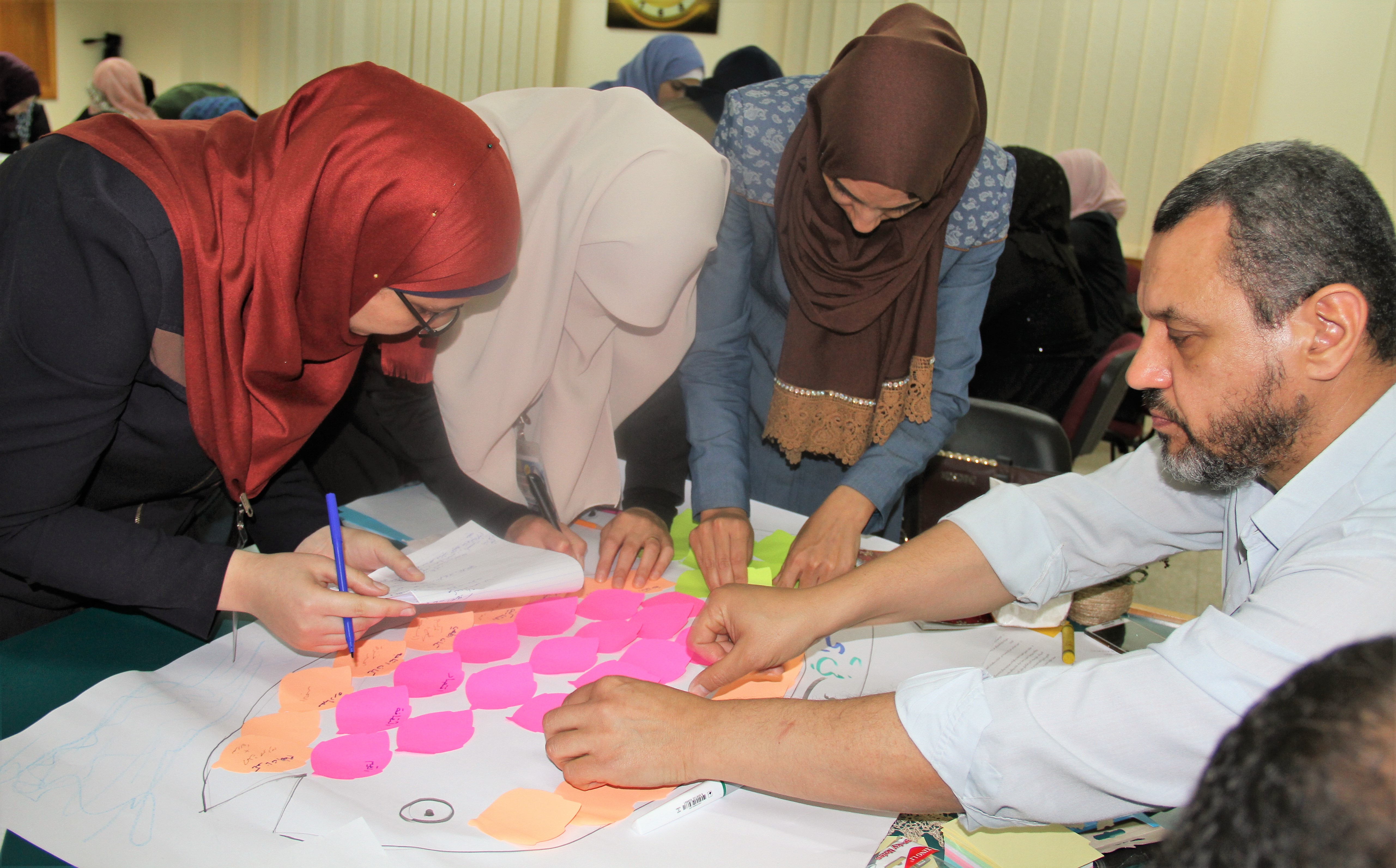

In Gaza, the Educational Research and Development Programme (ERDP) / A. M. Qattan Foundation organised three workshops on the theme of Food Revolution. Bringing together a group of male and female teachers, the workshops were held as part of the preparations for the Science Days Palestine (SDP) 2018 Festival.
Workshops were moderated by Nizar al-Wahidi, Director General of the Guidance and Development Department at the Ministry of Agriculture, Gaza, and Ula Badawi, Manager of the ERDP Office, Gaza.
SDP 2017 Festival is themed around food revolution. Food is a key challenge of the modern age. Experts are warning against a crisis in years to come. The world will not be capable of feeding itself if the current situation remains unchanged, including population growth and high demand on food products. Towards mid-21st century, the world needs to produce as twice as the crops it currently plants. Communities need to think of other alternatives to cope with the potential crisis.
The first workshop covered several issues, including the ability of land to fulfil human needs for food and the impact of cultivating plants in non-native environments on living beings and the surrounding environment. Participants discussed the distinction between food and nutrition, introduced characteristics of the improper use of food and natural resources and wrong habits and concepts associated with the choice of foods.
In the second workshop, teachers elaborated on the relation between food and culture, focusing on how food becomes part of the every one of us and the special and personal values it implies for us. Teachers wrote stories about food, which had made a strong impression in their memories. Teachers shared and deconstructed these stories, including the social, cultural, economic and health elements and dimensions they entailed. For examples, stories made reference to the community, which features relations, linkages, life styles, customs and traditions, trades and professions. Stories also addressed the sources, cooking and people involved in food production. They spotlighted the values of food production versus consumption as well as the arts and aesthetics associated with food.
Mervat Urouq, a teacher, shared her story The Memory of War and Sugar. Mervat wrote: “During the Gulf War, we thought that missiles had chemical warheads. When these missiles were launched, my mother used to rush and close the windows and doors with nylon sheets and adhesive tape. We all sat in one room, but didn’t know how much time we’d stay there. My mother made cinnamon buns with sugar in large quantities. We ate and forgot the feeling of fear… I don’t know why it was cinnamon buns in particular!”
In her story Fattoush, teacher Jihan al-Najjar related: “When I was a little girl and my mother was alive, my brothers, sisters and I used to gather around the fattoush dish, which my mother used to prepare. It had beautiful colours, delicious taste and good smell. My mother passed away. Now, I prepare the fattoush dish in the same way for my children. They love it and love me.”
Samira al-Baz, a teacher, told a story about maftoul (couscous): “When expatriates returned, the family used to gather around delicious maftoul dishes. Every one talked about their memories, the pleasure of meeting, and the pain of departure. Expatriates no longer gather around maftoul dishes because the crossings are closed and love ones passed away.”
Teacher Anwar al-Farram recalls a painful memory when he sees a squash dish before and after it is prepared. It leaves him nervous because it is associated with the 2014 war on Gaza, which broke out when he was having stuffed squash for breakfast in Ramadan. Keeping away from this dish has been an involuntary conduct and a symbol of pessimism.
In the third workshop, participants examined a number of food items. Teachers read out the phrases, symbols and codes printed on these items to explore the ingredients of, and relation between each product and the concepts of hunger and satiety. They also learned how to read the table of nutritional values, identify spoiled products, and keep and store food.
During the summer break, teachers will work on small projects with students. Every project comprises a participatory journey of knowledge, which is designed and developed with all participants. This journey requires research, communication, work, production and innovation. The outputs of the journey will be shared at schools and with the local community during the SDP 2018 Festival.
